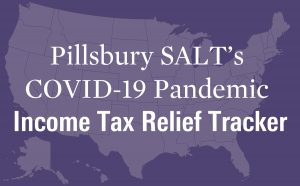 Forty-four states plus the District of Columbia impose an income tax on corporations. In response to the COVID-19 pandemic, 36 of those 45 jurisdictions have established income tax relief to corporate taxpayers in the form of tax payment extensions. Of those 36, most also extended the return filing deadline and have waived all penalties and interest during the extension period. Four states are playing hardball, affirmatively announcing no income tax relief will be provided to corporate taxpayers: Arkansas, Minnesota, Montana and New Hampshire. Three states seem to be keeping their heads in the sand, having made no announcement at all regarding tax relief to corporate taxpayers: Alaska, Massachusetts, and Pennsylvania. And two states appear to be on the fence: Florida and New Jersey.
Forty-four states plus the District of Columbia impose an income tax on corporations. In response to the COVID-19 pandemic, 36 of those 45 jurisdictions have established income tax relief to corporate taxpayers in the form of tax payment extensions. Of those 36, most also extended the return filing deadline and have waived all penalties and interest during the extension period. Four states are playing hardball, affirmatively announcing no income tax relief will be provided to corporate taxpayers: Arkansas, Minnesota, Montana and New Hampshire. Three states seem to be keeping their heads in the sand, having made no announcement at all regarding tax relief to corporate taxpayers: Alaska, Massachusetts, and Pennsylvania. And two states appear to be on the fence: Florida and New Jersey.
See our latest matrix for comprehensive coverage (updated April 14), on state income tax relief to corporations, other business entities, and individuals. Our coverage is organized in a manner that is quick to digest, and links to primary source authority are provided for ease of reference and to track future developments. Pillsbury SALT will continue to track these tax relief developments in the rapidly evolving landscape of the COVID-19 pandemic.
 SeeSALT Blog
SeeSALT Blog


 In addition to the COVID-19 pandemic relief federal and state authorities have provided to taxpayers in the form of delayed tax return filing and payment deadlines (
In addition to the COVID-19 pandemic relief federal and state authorities have provided to taxpayers in the form of delayed tax return filing and payment deadlines (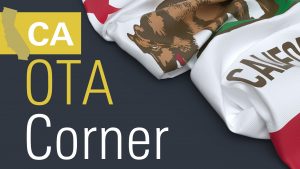 The California Office of Tax Appeals will hold an informal interested parties meeting on April 3, 2020, to discuss proposed amendments to its rules for tax appeals. The proposed amendments are in response to feedback from public and internal parties after the OTA began operating under its permanent rules for tax appeals since January 2019.
The California Office of Tax Appeals will hold an informal interested parties meeting on April 3, 2020, to discuss proposed amendments to its rules for tax appeals. The proposed amendments are in response to feedback from public and internal parties after the OTA began operating under its permanent rules for tax appeals since January 2019. A very interesting and heartening decision was just handed down by the Michigan Court of Appeals in
A very interesting and heartening decision was just handed down by the Michigan Court of Appeals in 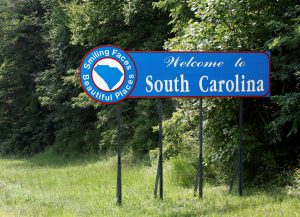 On March 6, 2020, the South Carolina Administrative Law Court entered an order in
On March 6, 2020, the South Carolina Administrative Law Court entered an order in  The New Mexico Court of Appeals decided a case illustrating the heavy risks of failing to comply with a court’s order. Specifically, the Court of Appeals upheld the District Court’s full dismissal of a taxpayer’s refund claim for violating a discovery order. In Bowman v. Manforte, the taxpayer sought a refund of Gross Receipts Tax arguing that her income was exempt as wage income rather than income from an independent business. The New Mexico Department of Revenue Services (“Department”) suspected the taxpayer’s federal tax return would reflect deductions against the income that would be permitted only if the income were business income and not wages for federal income tax purposes. The taxpayer refused to produce the federal tax return, claiming that the return was privileged from civil disclosure under New Mexico’s tax secrecy law. The Department brought the taxpayer’s refusal before the District Court and twice obtained orders requiring the taxpayer to produce the return. After the taxpayer failed to comply with the disclosure orders, the District Court took the dramatic step of dismissing the taxpayer’s refund claim altogether. The taxpayer appealed to the Court of Appeals.
The New Mexico Court of Appeals decided a case illustrating the heavy risks of failing to comply with a court’s order. Specifically, the Court of Appeals upheld the District Court’s full dismissal of a taxpayer’s refund claim for violating a discovery order. In Bowman v. Manforte, the taxpayer sought a refund of Gross Receipts Tax arguing that her income was exempt as wage income rather than income from an independent business. The New Mexico Department of Revenue Services (“Department”) suspected the taxpayer’s federal tax return would reflect deductions against the income that would be permitted only if the income were business income and not wages for federal income tax purposes. The taxpayer refused to produce the federal tax return, claiming that the return was privileged from civil disclosure under New Mexico’s tax secrecy law. The Department brought the taxpayer’s refusal before the District Court and twice obtained orders requiring the taxpayer to produce the return. After the taxpayer failed to comply with the disclosure orders, the District Court took the dramatic step of dismissing the taxpayer’s refund claim altogether. The taxpayer appealed to the Court of Appeals. 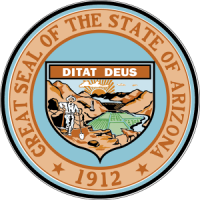 There have been two interesting developments in Arizona as a result of Wayfair. First, the Arizona House of Representatives pushed forward a resolution, H.C.M. 2006, last week to formally ask Congress to enact uniform national legislation to simplify sales tax or similar tax collection by all states and to reduce the burden of tax compliance on remote sellers. In addition, the Arizona Senate pushed forward S.C.M. 1003, requesting Congress to do the same, on February 13. Each bill needs to be sent to the other chamber for final passage. If either bill is passed, the measure would be transmitted to the federal government. Arizona would be the first state requesting federal intervention to ensure sales tax compliance simplicity in all states by passing state legislation.
There have been two interesting developments in Arizona as a result of Wayfair. First, the Arizona House of Representatives pushed forward a resolution, H.C.M. 2006, last week to formally ask Congress to enact uniform national legislation to simplify sales tax or similar tax collection by all states and to reduce the burden of tax compliance on remote sellers. In addition, the Arizona Senate pushed forward S.C.M. 1003, requesting Congress to do the same, on February 13. Each bill needs to be sent to the other chamber for final passage. If either bill is passed, the measure would be transmitted to the federal government. Arizona would be the first state requesting federal intervention to ensure sales tax compliance simplicity in all states by passing state legislation.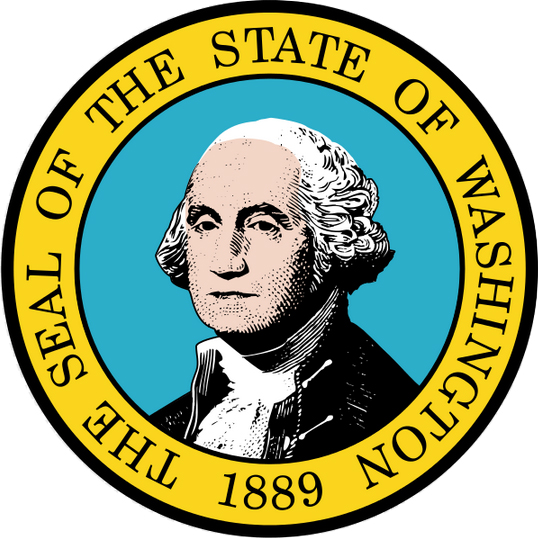 A Washington state trial judge partially granted the state’s motion to dismiss a lawsuit challenging the validity of a recently enacted Washington tax measure that increases the state’s Business & Occupation Tax (B&O Tax) on large, out-of-state financial institutions. The Plaintiffs, the Washington Bankers Association and American Bankers Association (collectively, the “Bankers Associations”) filed a challenge to invalidate House Bill 2167, which targets large out-of-state financial institutions by increasing Washington’s B&O Tax rate if the institution’s annual net income equals to or exceeds $1 billion. The Bankers Associations sought to invalidate the law, which became effective January 1, 2020, on the grounds that the measure violates: (1) the state’s constitutional requirement to introduce a bill at least 10 days prior to the adjournment of a legislative session; and (2) the U.S. Constitution’s Commerce Clause because it discriminates against out-of-state financial institutions by imposing a higher tax rate on out-of-state financial institutions versus in-state institutions. The state moved to dismiss the complaint, focusing on the procedural issue under the state’s constitution rather than the apparent discriminatory nature of the law. Specifically, the state asserted that the “enrolled bill doctrine” enjoined the Washington trial court from reviewing evidence, other than the final enrolled bill itself, to show that a constitutional violation occurred during the enactment process.
A Washington state trial judge partially granted the state’s motion to dismiss a lawsuit challenging the validity of a recently enacted Washington tax measure that increases the state’s Business & Occupation Tax (B&O Tax) on large, out-of-state financial institutions. The Plaintiffs, the Washington Bankers Association and American Bankers Association (collectively, the “Bankers Associations”) filed a challenge to invalidate House Bill 2167, which targets large out-of-state financial institutions by increasing Washington’s B&O Tax rate if the institution’s annual net income equals to or exceeds $1 billion. The Bankers Associations sought to invalidate the law, which became effective January 1, 2020, on the grounds that the measure violates: (1) the state’s constitutional requirement to introduce a bill at least 10 days prior to the adjournment of a legislative session; and (2) the U.S. Constitution’s Commerce Clause because it discriminates against out-of-state financial institutions by imposing a higher tax rate on out-of-state financial institutions versus in-state institutions. The state moved to dismiss the complaint, focusing on the procedural issue under the state’s constitution rather than the apparent discriminatory nature of the law. Specifically, the state asserted that the “enrolled bill doctrine” enjoined the Washington trial court from reviewing evidence, other than the final enrolled bill itself, to show that a constitutional violation occurred during the enactment process.